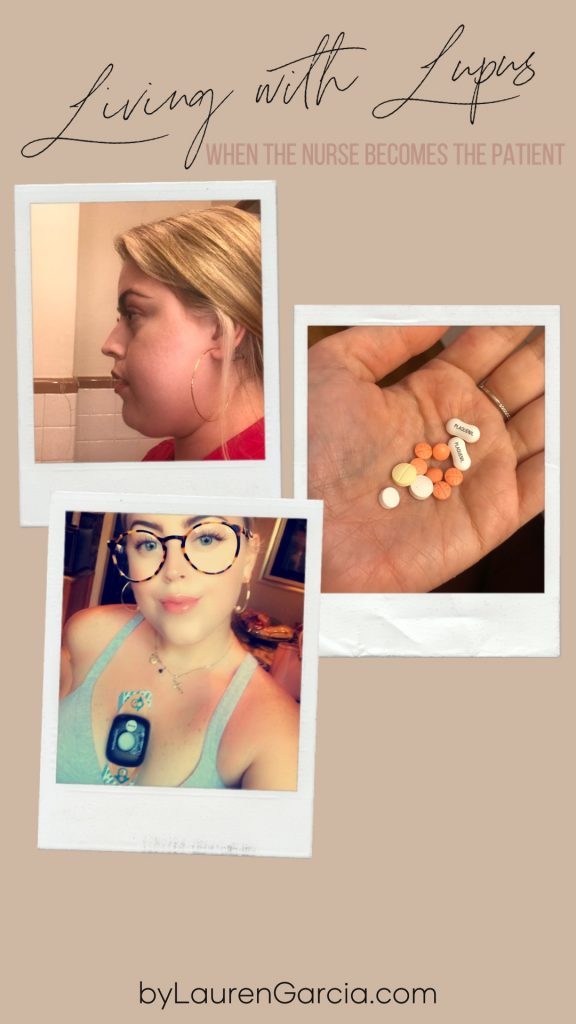This is an extremely personal and raw post for me, since I have not been very vocal about my diagnosis with systemic lupus erythematosus. However, September is Rheumatic Disease Awareness Month and I want to be able to use this platform to empower women and raise awareness so I’m going to share my journey of living with lupus.
Definition of Lupus:
an autoimmune disease — meaning the body’s own immune system doesn’t function properly and attacks you by mistake — and affects multiple organs throughout the body.

In December of 2018, I was dealing with a lot of pain, headaches, brain fog, hair loss and a rash on my face. I would spend my nights crying and unable to sleep. If anyone knows or is a nurse, you’re aware that we are consistently putting our health on the back burner. Everyone, including myself, would say, “don’t worry – it’s just stress. Just relax and you’ll feel better.” But deep down, I knew better. I finally listened to my body and visited my primary care provider, a dermatologist and two different rheumatologists.
On February 14th, I received my official diagnosis. I was ‘living with lupus’. If I’m being completely transparent and honest, I swear at that moment I couldn’t even feel my body or anything going on around me. My dad was in the room asking all these questions and all I could think of was “I have lupus. LUPUS.” (over and over again). And then it got worse. The doctor started talking about all the possible complications and even though I still felt frozen, the tears started.
POSSIBLE COMPLICATIONS (REFERENCE)
- Kidneys. Lupus can cause serious kidney damage, and kidney failure is one of the leading causes of death among people with lupus.
- Brain. If your brain is affected by lupus, you may experience headaches, dizziness, behavior changes, hallucinations, and even strokes or seizures. Many people with lupus experience memory problems and may have difficulty expressing their thoughts.
- Blood and blood vessels. Lupus may lead to blood problems, including anemia and increased risk of bleeding or blood clotting. It can also cause inflammation of the blood vessels (vasculitis)
- Lungs. Having lupus increases your chances of developing an inflammation of the chest cavity lining (pleurisy), which can make breathing painful.
- Heart. Lupus can cause inflammation of your heart muscle, your arteries or heart membrane (pericarditis). The risk of cardiovascular disease and heart attacks increases greatly as well.
- Infection. People with lupus are more vulnerable to infection because both the disease and its treatments weaken the immune system.
- Cancer. Having lupus appears to increase your risk of cancer.
- Bone tissue death (avascular necrosis). This occurs when the blood supply to a bone diminishes, often leading to tiny breaks in the bone and eventually to the bone’s collapse. The hip joint is most commonly affected.
- Pregnancy complications. Women with lupus have an increased risk of miscarriage. Lupus increases the risk of high blood pressure during pregnancy (preeclampsia) and preterm birth. To reduce the risk of these complications, doctors recommend delaying pregnancy until your disease has been under control for at least 6 months.
The last one felt like he stuck a dagger in my heart and twisted it. The hopes of being a mother were crashing around me and I felt like such a failure… like I didn’t and wouldn’t have any control of my body.
The first 8-10 months after my diagnosis consisted of follow up appointments, blood work, and taking tons of medication. I was still losing so much hair, having cardiac issues and the medicine (especially, the prednisone) was making me so bloated. Overall, I believe I am a strong woman and I dealt with the physical pain (even when I felt like a young woman in an old lady’s body). But nothing could have prepared me for the emotional and mental toll this chronic and invisible disease was causing me. I couldn’t even recognize the person in the mirror anymore. I fell into a really dark depression and it was hurting relationships, my career, and school work.
Flash forward to a year and a half after my diagnosis and I am still struggling but with the help of my fiance and family – I’m finally starting to feel like myself again.
My takeaways from my diagnosis and living with lupus have been:
- Always trust your gut. You know yourself and your body. If something doesn’t feel right… do something about it. Be your own best advocate.
- As hard as it gets, do not push people away. You’re going to feel alone in this so it’s important to have a great support system.
- SELF-CARE 101: Cry when you need to. Sleep when you want to. Take mental health days.

If you want to learn more about lupus, you can check out this website.


[…] look. Basically, this is one of my favorite outfits (all thanks to the butterfly blouse)! As per my most recent post, you guys know I have lupus and butterflies are symbols of hope for those affected by this chronic […]